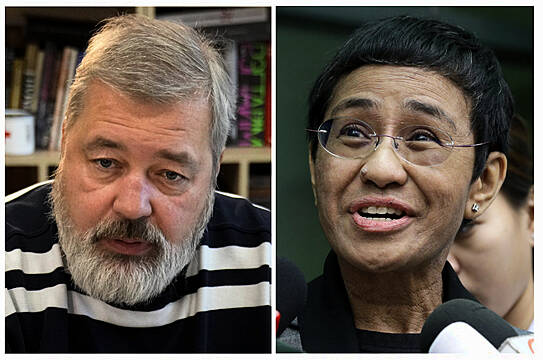Two journalists have won the 2021 Nobel Peace Prize for their fight for freedom of expression in countries where media outlets have faced persistent attacks and reporters have been murdered.
The Norwegian Nobel Committee said the battles of Maria Ressa of the Philippines and Dmitry Muratov of Russia are vital in promoting peace.
“Free, independent and fact-based journalism serves to protect against abuse of power, lies and war propaganda,” said Berit Reiss-Andersen, chair of the committee.
BREAKING NEWS:
The Norwegian Nobel Committee has decided to award the 2021 Nobel Peace Prize to Maria Ressa and Dmitry Muratov for their efforts to safeguard freedom of expression, which is a precondition for democracy and lasting peace.#NobelPrize #NobelPeacePrize pic.twitter.com/KHeGG9YOTT— The Nobel Prize (@NobelPrize) October 8, 2021
Advertisement
“Without freedom of expression and freedom of the press, it will be difficult to successfully promote fraternity between nations, disarmament and a better world order to succeed in our time,” she said.
Ms Ressa in 2012 co-founded Rappler, a news website that has focused “critical attention on the (President Rodrigo) Duterte regime’s controversial, murderous anti-drug campaign”, the Nobel committee said.
She and Rappler “have also documented how social media is being used to spread fake news, harass opponents and manipulate public discourse”.
Reacting to the Nobel news, Ms Ressa told Norway’s TV2 channel that “the government (of the Philippines) will obviously not be happy”.
“I’m a little shocked. It’s really emotional,” she added. “But I am happy on behalf of my team and would like to thank the Nobel committee for recognising what we are going through.”

The award-winning journalist was convicted last year of libel and sentenced to jail in a decision seen as a major blow to press freedom.
Mr Muratov was one of the founders of the independent Russian newspaper Novaya Gazeta in 1993.
“Novaya Gazeta is the most independent newspaper in Russia today, with a fundamentally critical attitude towards power,” the committee said.
“The newspaper’s fact-based journalism and professional integrity have made it an important source of information on censurable aspects of Russian society rarely mentioned by other media.”
Mr Muratov said he would use his win to help independent journalists who have faced growing pressure from the authorities, including those who were officially declared “foreign agents” — a designation that carries pejorative connotations and implies additional government scrutiny.
“We will use it to shore up Russian journalism that has faced repressions,” he said. “We will try to help the people who have been designated as agents, have faced persecution and have been forced out of the country.”

According to the Committee to Protect Journalists, 17 media workers have been killed in the Philippines in the last decade and 23 in Russia.
Former Soviet leader Mikhail Gorbachev used some of his prize money from winning the Nobel in 1990 to help what would become Novaya Gazeta buy office equipment and computers.
The Nobel committee noted that since the launch of Novaya Gazeta, six of its journalists have been killed, including Anna Politkovskaya, who covered Russia’s bloody conflict in Chechnya.
Ms Reiss-Andersen noted that the peace prize has gone to journalists in the past, including Ernesto Teodoro Moneta of Italy, who was cited in 1907 “for his work in the press and in peace meetings”.
In 1935, Carl von Ossietzky was awarded the prize “for his burning love for freedom of thought and expression” after revealing that Germany was secretly re-arming after the First World War.
Ms Reiss-Andersen also noted the risks to free speech in today’s world due to the spread of fake news, noting that Ms Ressa has been critical of Facebook’s role in manipulating public debate.
"Without freedom of expression and freedom of the press, it will be difficult to successfully promote fraternity between nations, disarmament and a better world order to succeed in our time" Berit Reiss-Andersen, chair of the Norwegian Nobel Committee. #pressfreedom#NobelPrize pic.twitter.com/MJPOcplP42
— Committee to Protect Journalists (@pressfreedom) October 8, 2021
“Conveying fake news and information that is propaganda and untrue is also a violation of freedom of expression, and all freedom of expression has its limitations. That is also a very important factor in this debate,” she said.
The prestigious award is accompanied by a gold medal and 10 million Swedish kronor (£836,000). The prize money comes from a bequest left by the prize’s creator, Swedish inventor Alfred Nobel, who died in 1895.
Media rights group Reporters Without Borders celebrated the announcement, expressing “joy and urgency” in reaction to the news, adding: “This prize is a great signal, a very powerful message to defend journalism everywhere.”
After the announcement, the Nobel committee itself was put on the spot by a reporter who asked about its decision to award the 2019 peace prize to Ethiopian Prime Minister Abiy Ahmed, who has since become entangled in a domestic conflict with the powerful Tigray region.
Ms Reiss-Andersen replied: “I will not comment on other Nobel laureates and other issues than we have on the table today, but I can mention that the situation for freedom of press in Ethiopia is very far from ideal and is facing severe restrictions.”







